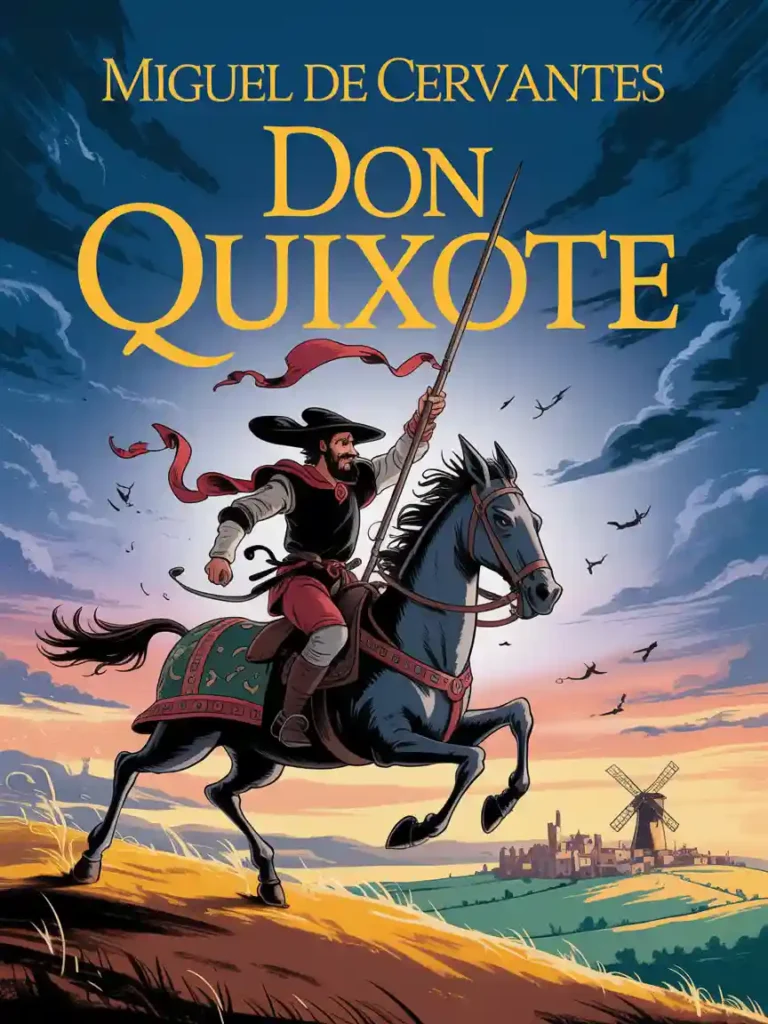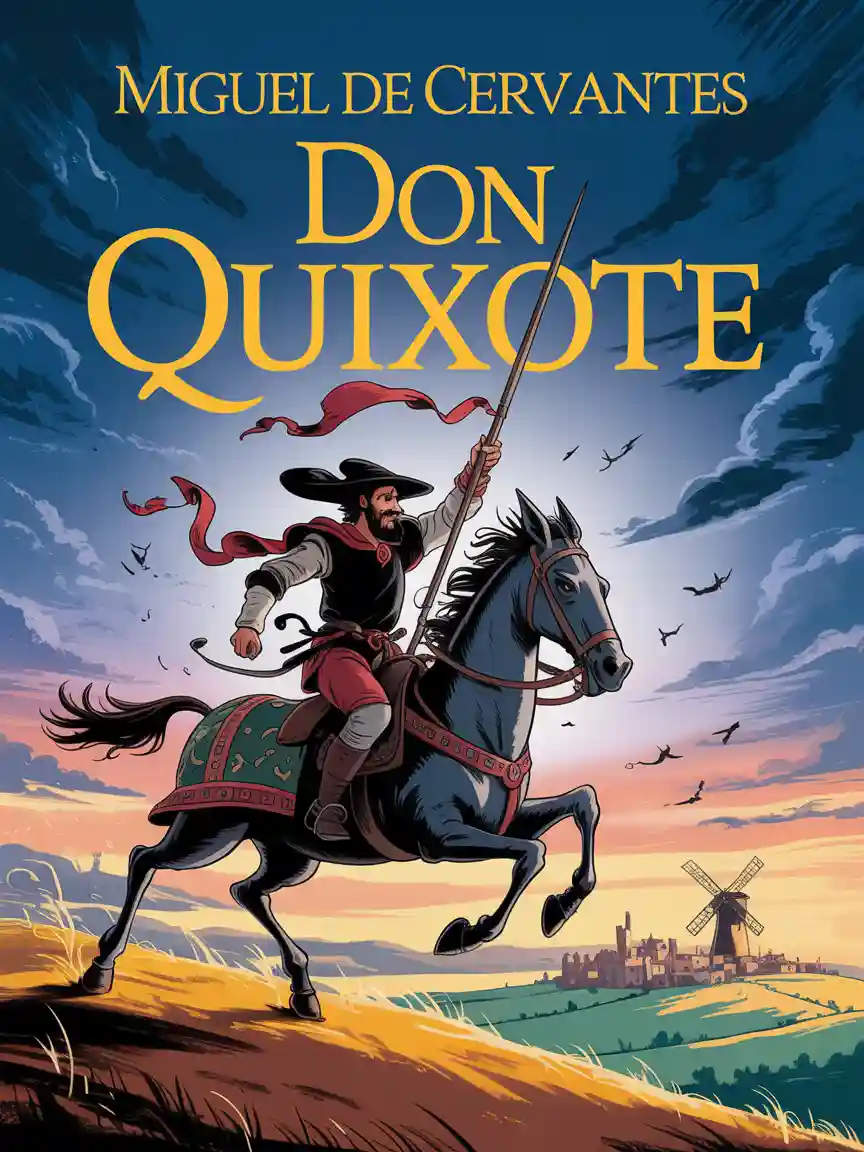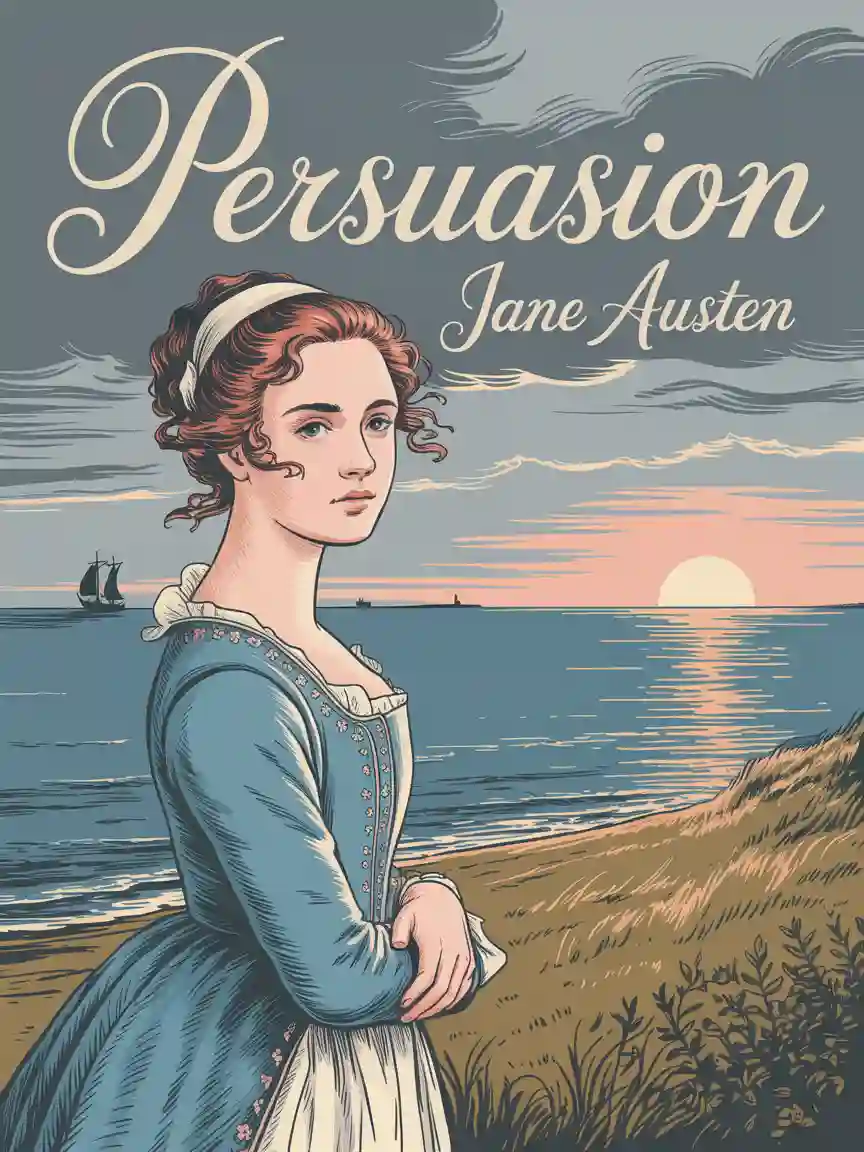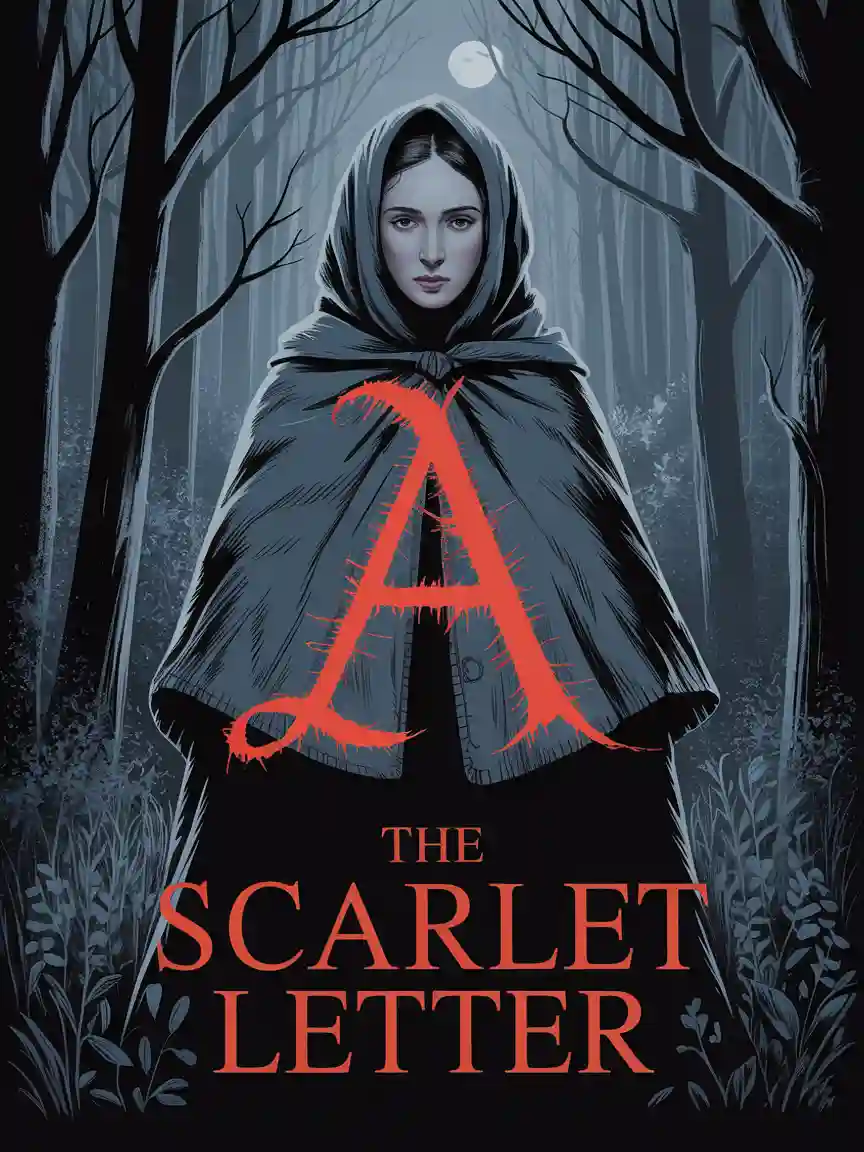CHAPTER 19
IN WHICH IS RELATED THE ADVENTURE OF THE ENAMOURED SHEPHERD, TOGETHER
WITH OTHER TRULY DROLL INCIDENTS
Don Quixote had gone but a short distance beyond Don Diego’s village,
when he fell in with a couple of either priests or students, and a couple of
peasants, mounted on four beasts of the ass kind. One of the students car-
ried, wrapped up in a piece of green buckram by way of a portmanteau,
what seemed to be a little linen and a couple of pairs of-ribbed stockings;
the other carried nothing but a pair of new fencing-foils with buttons. The
peasants carried divers articles that showed they were on their way from
some large town where they had bought them, and were taking them home
to their village; and both students and peasants were struck with the same
amazement that everybody felt who saw Don Quixote for the first time, and
were dying to know who this man, so different from ordinary men, could
be. Don Quixote saluted them, and after ascertaining that their road was the
same as his, made them an offer of his company, and begged them to slack-
en their pace, as their young asses travelled faster than his horse; and then,
to gratify them, he told them in a few words who he was and the calling and
profession he followed, which was that of a knight-errant seeking adven-
tures in all parts of the world. He informed them that his own name was
Don Quixote of La Mancha, and that he was called, by way of surname, the
Knight of the Lions.
All this was Greek or gibberish to the peasants, but not so to the students,
who very soon perceived the crack in Don Quixote’s pate; for all that, how-
ever, they regarded him with admiration and respect, and one of them said
to him, “If you, sir knight, have no fixed road, as it is the way with those
who seek adventures not to have any, let your worship come with us; you
will see one of the finest and richest weddings that up to this day have ever
been celebrated in La Mancha, or for many a league round.”
Don Quixote asked him if it was some prince’s, that he spoke of it in this
way. “Not at all,” said the student; “it is the wedding of a farmer and a
farmer’s daughter, he the richest in all this country, and she the fairest mor-
tal ever set eyes on. The display with which it is to be attended will be
something rare and out of the common, for it will be celebrated in a mead-
ow adjoining the town of the bride, who is called, par excellence, Quiteria
the fair, as the bridegroom is called Camacho the rich. She is eighteen, and
he twenty-two, and they are fairly matched, though some knowing ones,
who have all the pedigrees in the world by heart, will have it that the family
of the fair Quiteria is better than Camacho’s; but no one minds that now-a-
days, for wealth can solder a great many flaws. At any rate, Camacho is
free-handed, and it is his fancy to screen the whole meadow with boughs
and cover it in overhead, so that the sun will have hard work if he tries to
get in to reach the grass that covers the soil. He has provided dancers too,
not only sword but also bell-dancers, for in his own town there are those
who ring the changes and jingle the bells to perfection; of shoe-dancers I
say nothing, for of them he has engaged a host. But none of these things,
nor of the many others I have omitted to mention, will do more to make this
a memorable wedding than the part which I suspect the despairing Basilio
will play in it. This Basilio is a youth of the same village as Quiteria, and he
lived in the house next door to that of her parents, of which circumstance
Love took advantage to reproduce to the word the long-forgotten loves of
Pyramus and Thisbe; for Basilio loved Quiteria from his earliest years, and
she responded to his passion with countless modest proofs of affection, so
that the loves of the two children, Basilio and Quiteria, were the talk and
the amusement of the town. As they grew up, the father of Quiteria made up
his mind to refuse Basilio his wonted freedom of access to the house, and to
relieve himself of constant doubts and suspicions, he arranged a match for
his daughter with the rich Camacho, as he did not approve of marrying her
to Basilio, who had not so large a share of the gifts of fortune as of nature;
for if the truth be told ungrudgingly, he is the most agile youth we know, a
mighty thrower of the bar, a first-rate wrestler, and a great ball-player; he
runs like a deer, and leaps better than a goat, bowls over the nine-pins as if
by magic, sings like a lark, plays the guitar so as to make it speak, and,
above all, handles a sword as well as the best.”
“For that excellence alone,” said Don Quixote at this, “the youth deserves
to marry, not merely the fair Quiteria, but Queen Guinevere herself, were
she alive now, in spite of Launcelot and all who would try to prevent it.”
“Say that to my wife,” said Sancho, who had until now listened in si-
lence, “for she won’t hear of anything but each one marrying his equal,
holding with the proverb ‘each ewe to her like.’ What I would like is that
this good Basilio (for I am beginning to take a fancy to him already) should
marry this lady Quiteria; and a blessing and good luck—I meant to say the
opposite—on people who would prevent those who love one another from
marrying.”
“If all those who love one another were to marry,” said Don Quixote, “it
would deprive parents of the right to choose, and marry their children to the
proper person and at the proper time; and if it was left to daughters to
choose husbands as they pleased, one would be for choosing her father’s
servant, and another, some one she has seen passing in the street and fancies
gallant and dashing, though he may be a drunken bully; for love and fancy
easily blind the eyes of the judgment, so much wanted in choosing one’s
way of life; and the matrimonial choice is very liable to error, and it needs
great caution and the special favour of heaven to make it a good one. He
who has to make a long journey, will, if he is wise, look out for some trusty
and pleasant companion to accompany him before he sets out. Why, then,
should not he do the same who has to make the whole journey of life down
to the final halting-place of death, more especially when the companion has
to be his companion in bed, at board, and everywhere, as the wife is to her
husband? The companionship of one’s wife is no article of merchandise,
that, after it has been bought, may be returned, or bartered, or changed; for
it is an inseparable accident that lasts as long as life lasts; it is a noose that,
once you put it round your neck, turns into a Gordian knot, which, if the
scythe of Death does not cut it, there is no untying. I could say a great deal
more on this subject, were I not prevented by the anxiety I feel to know if
the senor licentiate has anything more to tell about the story of Basilio.”
To this the student, bachelor, or, as Don Quixote called him, licentiate,
replied, “I have nothing whatever to say further, but that from the moment
Basilio learned that the fair Quiteria was to be married to Camacho the rich,
he has never been seen to smile, or heard to utter rational word, and he al-
ways goes about moody and dejected, talking to himself in a way that
shows plainly he is out of his senses. He eats little and sleeps little, and all
he eats is fruit, and when he sleeps, if he sleeps at all, it is in the field on the
hard earth like a brute beast. Sometimes he gazes at the sky, at other times
he fixes his eyes on the earth in such an abstracted way that he might be
taken for a clothed statue, with its drapery stirred by the wind. In short, he
shows such signs of a heart crushed by suffering, that all we who know him
believe that when to-morrow the fair Quiteria says ‘yes,’ it will be his sen-
tence of death.”
“God will guide it better,” said Sancho, “for God who gives the wound
gives the salve; nobody knows what will happen; there are a good many
hours between this and to-morrow, and any one of them, or any moment,
the house may fall; I have seen the rain coming down and the sun shining
all at one time; many a one goes to bed in good health who can’t stir the
next day. And tell me, is there anyone who can boast of having driven a nail
into the wheel of fortune? No, faith; and between a woman’s ‘yes’ and ‘no’ I
wouldn’t venture to put the point of a pin, for there would not be room for
it; if you tell me Quiteria loves Basilio heart and soul, then I’ll give him a
bag of good luck; for love, I have heard say, looks through spectacles that
make copper seem gold, poverty wealth, and blear eyes pearls.”
“What art thou driving at, Sancho? curses on thee!” said Don Quixote;
“for when thou takest to stringing proverbs and sayings together, no one can
understand thee but Judas himself, and I wish he had thee. Tell me, thou an-
imal, what dost thou know about nails or wheels, or anything else?”
“Oh, if you don’t understand me,” replied Sancho, “it is no wonder my
words are taken for nonsense; but no matter; I understand myself, and I
know I have not said anything very foolish in what I have said; only your
worship, senor, is always gravelling at everything I say, nay, everything I
do.”
“Cavilling, not gravelling,” said Don Quixote, “thou prevaricator of hon-
est language, God confound thee!”
“Don’t find fault with me, your worship,” returned Sancho, “for you know
I have not been bred up at court or trained at Salamanca, to know whether I
am adding or dropping a letter or so in my words. Why! God bless me, it’s
not fair to force a Sayago-man to speak like a Toledan; maybe there are
Toledans who do not hit it off when it comes to polished talk.”
“That is true,” said the licentiate, “for those who have been bred up in the
Tanneries and the Zocodover cannot talk like those who are almost all day
pacing the cathedral cloisters, and yet they are all Toledans. Pure, correct,
elegant and lucid language will be met with in men of courtly breeding and
discrimination, though they may have been born in Majalahonda; I say of
discrimination, because there are many who are not so, and discrimination
is the grammar of good language, if it be accompanied by practice. I, sirs,
for my sins have studied canon law at Salamanca, and I rather pique myself
on expressing my meaning in clear, plain, and intelligible language.”
“If you did not pique yourself more on your dexterity with those foils you
carry than on dexterity of tongue,” said the other student, “you would have
been head of the degrees, where you are now tail.”
“Look here, bachelor Corchuelo,” returned the licentiate, “you have the
most mistaken idea in the world about skill with the sword, if you think it
useless.”
“It is no idea on my part, but an established truth,” replied Corchuelo;
“and if you wish me to prove it to you by experiment, you have swords
there, and it is a good opportunity; I have a steady hand and a strong arm,
and these joined with my resolution, which is not small, will make you con-
fess that I am not mistaken. Dismount and put in practice your positions and
circles and angles and science, for I hope to make you see stars at noonday
with my rude raw swordsmanship, in which, next to God, I place my trust
that the man is yet to be born who will make me turn my back, and that
there is not one in the world I will not compel to give ground.”
“As to whether you turn your back or not, I do not concern myself,”
replied the master of fence; “though it might be that your grave would be
dug on the spot where you planted your foot the first time; I mean that you
would be stretched dead there for despising skill with the sword.”
“We shall soon see,” replied Corchuelo, and getting off his ass briskly, he
drew out furiously one of the swords the licentiate carried on his beast.
“It must not be that way,” said Don Quixote at this point; “I will be the
director of this fencing match, and judge of this often disputed question;”
and dismounting from Rocinante and grasping his lance, he planted himself
in the middle of the road, just as the licentiate, with an easy, graceful bear-
ing and step, advanced towards Corchuelo, who came on against him, dart-
ing fire from his eyes, as the saying is. The other two of the company, the
peasants, without dismounting from their asses, served as spectators of the
mortal tragedy. The cuts, thrusts, down strokes, back strokes and doubles,
that Corchuelo delivered were past counting, and came thicker than hops or
hail. He attacked like an angry lion, but he was met by a tap on the mouth
from the button of the licentiate’s sword that checked him in the midst of his
furious onset, and made him kiss it as if it were a relic, though not as de-
voutly as relics are and ought to be kissed. The end of it was that the licenti-
ate reckoned up for him by thrusts every one of the buttons of the short cas-
sock he wore, tore the skirts into strips, like the tails of a cuttlefish, knocked
off his hat twice, and so completely tired him out, that in vexation, anger,
and rage, he took the sword by the hilt and flung it away with such force,
that one of the peasants that were there, who was a notary, and who went
for it, made an affidavit afterwards that he sent it nearly three-quarters of a
league, which testimony will serve, and has served, to show and establish
with all certainty that strength is overcome by skill.
Corchuelo sat down wearied, and Sancho approaching him said, “By my
faith, senor bachelor, if your worship takes my advice, you will never chal-
lenge anyone to fence again, only to wrestle and throw the bar, for you have
the youth and strength for that; but as for these fencers as they call them, I
have heard say they can put the point of a sword through the eye of a
needle.”
“I am satisfied with having tumbled off my donkey,” said Corchuelo,
“and with having had the truth I was so ignorant of proved to me by experi-
ence;” and getting up he embraced the licentiate, and they were better
friends than ever; and not caring to wait for the notary who had gone for the
sword, as they saw he would be a long time about it, they resolved to push
on so as to reach the village of Quiteria, to which they all belonged, in good
time.
During the remainder of the journey the licentiate held forth to them on
the excellences of the sword, with such conclusive arguments, and such fig-
ures and mathematical proofs, that all were convinced of the value of the
science, and Corchuelo cured of his dogmatism.
It grew dark; but before they reached the town it seemed to them all as if
there was a heaven full of countless glittering stars in front of it. They
heard, too, the pleasant mingled notes of a variety of instruments, flutes,
drums, psalteries, pipes, tabors, and timbrels, and as they drew near they
perceived that the trees of a leafy arcade that had been constructed at the
entrance of the town were filled with lights unaffected by the wind, for the
breeze at the time was so gentle that it had not power to stir the leaves on
the trees. The musicians were the life of the wedding, wandering through
the pleasant grounds in separate bands, some dancing, others singing, others
playing the various instruments already mentioned. In short, it seemed as
though mirth and gaiety were frisking and gambolling all over the meadow.
Several other persons were engaged in erecting raised benches from which
people might conveniently see the plays and dances that were to be per-
formed the next day on the spot dedicated to the celebration of the marriage
of Camacho the rich and the obsequies of Basilio. Don Quixote would not
enter the village, although the peasant as well as the bachelor pressed him;
he excused himself, however, on the grounds, amply sufficient in his opin-
ion, that it was the custom of knights-errant to sleep in the fields and woods
in preference to towns, even were it under gilded ceilings; and so turned
aside a little out of the road, very much against Sancho’s will, as the good
quarters he had enjoyed in the castle or house of Don Diego came back to
his mind.





